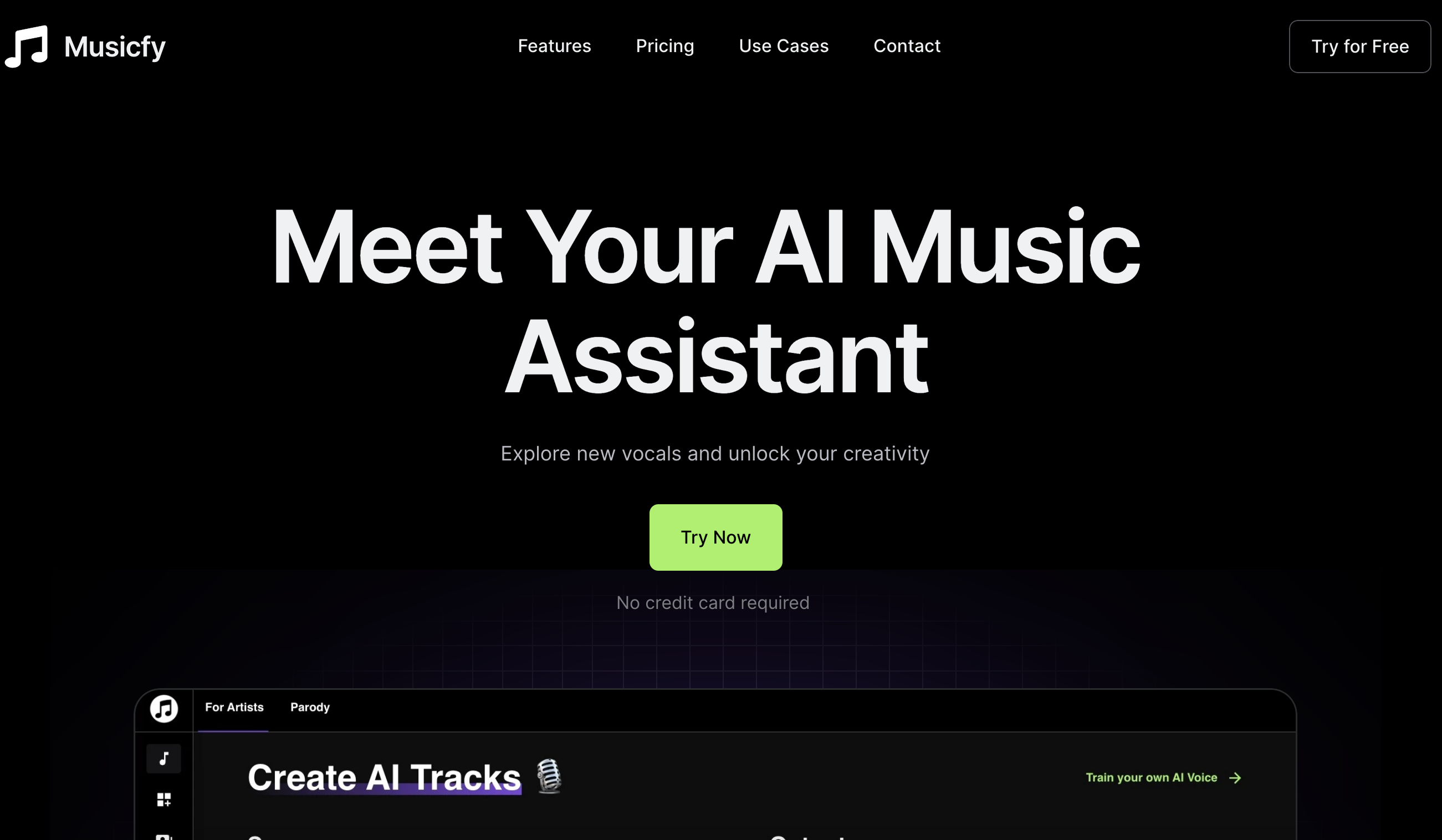- Home
- AI Stems Splitter
- Musicfy

Musicfy
Open Website-
Tool Introduction:Make AI voice clones, convert vocals, split stems, craft character covers.
-
Inclusion Date:Oct 21, 2025
-
Social Media & Email:
Tool Information
What is Musicfy AI
Musicfy AI is an AI music assistant for creating and using AI voice clones in any song or project. It combines precise AI voice conversion, a built-in stem splitter for vocal and instrument isolation, and a library of character voices to generate high-quality AI covers. By preserving timing and expression from the original performance, Musicfy helps artists and creators turn ideas into shareable tracks, experiment with styles, and accelerate workflows without costly re-recording or complex setup.
Musicfy AI Key Features
- AI Voice Cloning: Create a custom voice model from your own recordings to match your tone and style for future projects.
- AI Voice Conversion: Apply a selected voice to existing vocals while maintaining pitch, timing, and performance nuances.
- Stem Splitter: Isolate vocals, drums, bass, and instruments for remixing, sampling, practicing, or cleaner conversions.
- AI Covers with Character Voices: Choose from various character voices to reimagine songs and explore creative directions.
- Fast Previews and Exports: Generate quick test renders and export processed audio for further editing.
- DAW-Friendly Workflow: Import and export audio to use alongside Ableton Live, Logic Pro, FL Studio, and other DAWs.
Who Is Musicfy AI For
Musicfy AI suits singers, producers, and songwriters who need fast demos, vocal alternates, or cover versions. It also helps content creators, YouTubers, TikTokers, podcasters, and video editors who want distinctive vocals without booking studio time. Educators and students can use it for arrangement practice, while indie artists and hobbyists can explore new genres or voices safely and efficiently.
How to Use Musicfy AI
- Sign up and create a project.
- Upload a clean vocal or record directly in-app.
- (Optional) Use the stem splitter to isolate vocals from a mixed track.
- Select a voice model (your cloned voice or a character voice) for conversion.
- Adjust basic settings if available (e.g., strength or mix) and generate a preview.
- Review the result, make refinements, and re-render if needed.
- Export the processed audio and import it into your DAW or video editor.
Musicfy AI Industry Use Cases
In music production, a producer can convert a demo singer’s take into the artist’s voice to test fit before a studio session. Content teams can create compliant cover snippets with character voices for social campaigns. In film and game audio, teams can prototype temp vocals that match a character’s timbre. Educators can isolate stems for ear training, arrangement, and mixing practice.
Musicfy AI Pricing
Pricing and plan availability may change over time. Visit the official Musicfy AI website for current tiers, usage limits, and any free or trial options.
Musicfy AI Pros and Cons
Pros:
- Accurate AI voice conversion that preserves performance nuances.
- Integrated stem splitter for cleaner inputs and flexible remixes.
- Character voices enable quick, creative AI covers.
- Fast previews and straightforward exports streamline workflows.
- Works alongside any standard DAW and video editor.
Cons:
- Quality depends heavily on clean, well-recorded source vocals.
- Possible artifacts on noisy or highly processed inputs.
- Legal and licensing considerations for voice likenesses and copyrighted songs.
- Not a full DAW or mixing suite; advanced production still requires external tools.
Musicfy AI Popular Questions
-
Can I legally make AI covers with character or cloned voices?
Always check copyright, voice rights, and platform policies. You may need permission to use specific songs or voice likenesses, especially for commercial releases.
-
What audio works best for conversion?
Clean, dry, and isolated vocals at standard sample rates yield the most natural results. Avoid heavy effects and background noise.
-
Does Musicfy AI change melody or lyrics?
It focuses on timbre conversion—preserving pitch and timing from the source. For composition or lyric changes, use your DAW or other tools.
-
Can I use the outputs in my DAW?
Yes. Export the processed audio and import it into any DAW or editor for mixing, mastering, or post-production.



